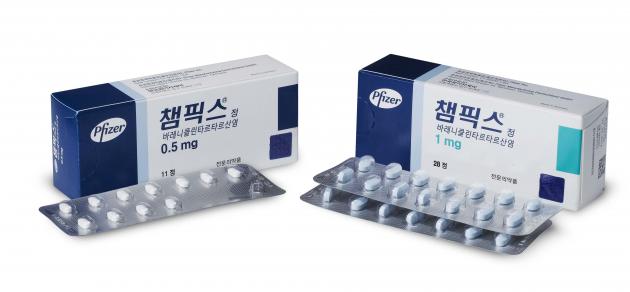Korea’s drugmakers are challenging Champix (compound: Varenicline tartrate), a smoking cessation treatment supplement by Pfizer화이자 which has dominated the market since the government implemented the antismoking policy. After 11 domestic pharmaceuticals received a favorable decision with respect to Pfizer’s salt related patent, some began to develop follow-up drugs of Champix.

The Intellectual Property Trial and Appeal Board (IPTAB), after deliberating on the scope of a right concerning tartrate and its substances, filed by the 11 Korean companies in February last year, ruled they did not infringe on the patent as they are pursuing products other than varenicline tartrate.
Companies that succeeded to avoid the patent were Kukje Pharma국제약품, Kyungdong Pharm경동제약, Daewoong Pharmaceutical대웅제약, Boryung Pharm 보령제약, CTC Bio씨티씨바이오, Ildong Pharmaceutical 일동제약, Jungwoo Pharm정우신약, Jeil Pharmaceutical 제일약품, Corepharmbio코아팜바이오, Kolmar Korea한국콜마, Hutecs Korea Pharmaceuticals한국휴텍스제약. These companies could avoid Pfizer’s salt related patent by changing Varenicline tartrate to Varenicline salicylate.
Jeil Pharmaceutical was the first company to begin to develop the follow-up drug of Champix. The Ministry of Food and Drug Safety식품의약품안전처(MFDS) Friday approved the plan for Phase 1 clinical trials of Zeropix (compound: Varenicline tartrate) Jeil had requested. The Phase 1 clinical trials of Zeropix will compare pharmacodynamics characteristics and safety after one time injection of Zeropix 1mg and Champix 1mg for healthy adult males.
But it will take time for Korean companies to release the follow-up drug of Champix on the market because Pfizer has the substance patent period of Champix left. The substance patent will expire on July 19, 2020, and the salt-related patent will end on Jan. 31, 2023.
Currently, many Korean drugmakers, such as Kukje Pharma, Daewoong Pharmaceutical, Aju Pharm아주약품, and Korea United Pharm한국유나이티드제약, have raised opposition to extending the patent period of Champix. The regulators have already extended the one and eight months, and domestic firms have been contending the invalidity of the extension. These companies can advance the release period of the follow-up drugs to before 2020, depending on the ruling at the lawsuit.

